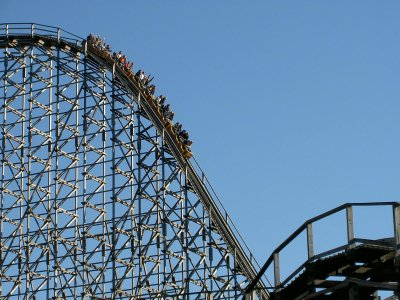Shock confession from theme park CEO: Could your favorite resort be shutting down for good after 50 years?
By
Veronica E.
- Replies 0
For generations, families across the region have made cherished memories at a beloved local amusement park and its neighboring water park.
Whether it was the rush of a first roller coaster ride, the sweet smell of funnel cakes wafting through the air, or a day spent cooling off in the wave pool, these parks have long offered an accessible and affordable summer escape for visitors of all ages.
Now, the parks—Six Flags America and Hurricane Harbor—are preparing to close their gates for good.
The sound of laughter, splashing water, and coaster screams is nearing its final season.
The beloved Maryland theme park is officially set to close its gates for good on November 2.
The announcement has left many stunned—and sparked a larger question in the hearts of loyal guests and theme park fans alike: In a changing world, are any of the classic American amusement parks truly safe from disappearing?

The news broke with a heavy heart and a candid admission from Richard Zimmerman, President and CEO of Six Flags.
In a statement that stunned both employees and loyal guests, Zimmerman revealed, “As part of our comprehensive review of our park portfolio, we have determined that Six Flags America and Hurricane Harbor are not a strategic fit with the company’s long-term growth plan.”
In other words, the park that’s been a staple of summer fun for 50 years no longer fits into the company’s vision for the future.
It’s a decision that wasn’t made lightly.
More than 70 full-time staff members will be directly impacted, and the ripple effects will be felt throughout the community.
The 500-acre site is now up for sale, with Six Flags executives hoping to “unlock the full value of our portfolio” by redeveloping the land.
Six Flags America’s story began in 1974, not as a theme park, but as a safari adventure.
Over the decades, it evolved, rebranding in 1999 to become the Six Flags America we know today—a place where generations of families have celebrated birthdays, braved their first roller coasters, and cooled off in the adjacent Hurricane Harbor water park.
But now, both parks are set to become relics of the past.
The closure isn’t just a business decision; it’s a cultural loss for the region.
Local lawmakers, like George County Council Chair Edward Burroughs, have voiced their disappointment, calling the shutdown “deeply disappointing and a significant loss for our residents, particularly our children, who deserve safe, accessible, and engaging recreational spaces.”
The timing couldn’t be worse for Marylanders.
The announcement comes on the heels of another local bombshell: the Washington Commanders football team, after 30 years in Maryland, is moving to a new stadium in the District of Columbia.
“It has been a bad week with just the Commanders and the announcement of Six Flags, and this one was the more shocking one,” said DC Mayor Muriel Bowser. “We did not expect this.”
For many working families, the loss of Six Flags America is more than just the end of a fun day out—it’s the loss of an affordable, accessible escape.
Theme parks like this one have long provided a safe space for kids and teens, summer jobs for local youth, and a sense of community pride.
Six Flags America’s closure is part of a larger trend in the amusement industry.
As companies look to “optimize portfolios” and focus on their most profitable locations, smaller or less-visited parks are increasingly at risk.
Rising costs, changing entertainment habits, and the lingering effects of the pandemic have all put pressure on traditional theme parks.
For those of us who grew up with the magic of summer days spent at the local amusement park, it’s a sobering reminder: nothing lasts forever.
But it also raises important questions. How do we preserve spaces that bring communities together? What role should local government and private companies play in keeping these beloved institutions alive?
Read next: This popular sandwich chain is closing for good—don’t miss out

Were you a regular at Six Flags America or Hurricane Harbor? Do you have a favorite memory from the park—a first date, a family reunion, a ride you’ll never forget? Or are you worried that your own favorite local spot could be next on the chopping block? We want to hear from you! Share your stories, photos, and thoughts in the comments below!
Whether it was the rush of a first roller coaster ride, the sweet smell of funnel cakes wafting through the air, or a day spent cooling off in the wave pool, these parks have long offered an accessible and affordable summer escape for visitors of all ages.
Now, the parks—Six Flags America and Hurricane Harbor—are preparing to close their gates for good.
The sound of laughter, splashing water, and coaster screams is nearing its final season.
The beloved Maryland theme park is officially set to close its gates for good on November 2.
The announcement has left many stunned—and sparked a larger question in the hearts of loyal guests and theme park fans alike: In a changing world, are any of the classic American amusement parks truly safe from disappearing?

As theme parks across the country face rising costs and shifting priorities, closures like this one are becoming an all-too-familiar story. Image Source: Pexels / Angie.
A difficult decision at the top
The news broke with a heavy heart and a candid admission from Richard Zimmerman, President and CEO of Six Flags.
In a statement that stunned both employees and loyal guests, Zimmerman revealed, “As part of our comprehensive review of our park portfolio, we have determined that Six Flags America and Hurricane Harbor are not a strategic fit with the company’s long-term growth plan.”
In other words, the park that’s been a staple of summer fun for 50 years no longer fits into the company’s vision for the future.
It’s a decision that wasn’t made lightly.
More than 70 full-time staff members will be directly impacted, and the ripple effects will be felt throughout the community.
The 500-acre site is now up for sale, with Six Flags executives hoping to “unlock the full value of our portfolio” by redeveloping the land.
Also read: Unexpected incident at Disneyland raises questions about park safety and undercover security
A storied past, a sudden end
Six Flags America’s story began in 1974, not as a theme park, but as a safari adventure.
Over the decades, it evolved, rebranding in 1999 to become the Six Flags America we know today—a place where generations of families have celebrated birthdays, braved their first roller coasters, and cooled off in the adjacent Hurricane Harbor water park.
But now, both parks are set to become relics of the past.
The closure isn’t just a business decision; it’s a cultural loss for the region.
Local lawmakers, like George County Council Chair Edward Burroughs, have voiced their disappointment, calling the shutdown “deeply disappointing and a significant loss for our residents, particularly our children, who deserve safe, accessible, and engaging recreational spaces.”
Also read: Who gets to ride in style? The inclusivity debate in luxury cars
A community in mourning
The timing couldn’t be worse for Marylanders.
The announcement comes on the heels of another local bombshell: the Washington Commanders football team, after 30 years in Maryland, is moving to a new stadium in the District of Columbia.
“It has been a bad week with just the Commanders and the announcement of Six Flags, and this one was the more shocking one,” said DC Mayor Muriel Bowser. “We did not expect this.”
For many working families, the loss of Six Flags America is more than just the end of a fun day out—it’s the loss of an affordable, accessible escape.
Theme parks like this one have long provided a safe space for kids and teens, summer jobs for local youth, and a sense of community pride.
Also read: Having Fun At The Amusement Park
A broader trend: Are other parks at risk?
Six Flags America’s closure is part of a larger trend in the amusement industry.
As companies look to “optimize portfolios” and focus on their most profitable locations, smaller or less-visited parks are increasingly at risk.
Rising costs, changing entertainment habits, and the lingering effects of the pandemic have all put pressure on traditional theme parks.
For those of us who grew up with the magic of summer days spent at the local amusement park, it’s a sobering reminder: nothing lasts forever.
But it also raises important questions. How do we preserve spaces that bring communities together? What role should local government and private companies play in keeping these beloved institutions alive?
Read next: This popular sandwich chain is closing for good—don’t miss out
Key Takeaways
- Six Flags America and its sister water park, Hurricane Harbor, will permanently close on November 2 after more than 50 years in operation.
- CEO Richard Zimmerman cited the closure as part of a strategic review, stating the parks no longer align with the company’s long-term growth plans.
- Over 70 full-time staff will be affected, and the 500-acre property is being put up for sale, with redevelopment plans underway.
- Local officials and residents expressed disappointment over the loss of a longtime recreational space, especially one accessible to families and youth.
Were you a regular at Six Flags America or Hurricane Harbor? Do you have a favorite memory from the park—a first date, a family reunion, a ride you’ll never forget? Or are you worried that your own favorite local spot could be next on the chopping block? We want to hear from you! Share your stories, photos, and thoughts in the comments below!






